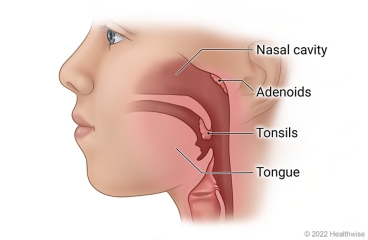Adenoid Problems in Children: Care Instructions
Overview

Adenoids are small areas of tissue at the back of the nose and throat. They're made of the same tissue that
forms the tonsils. They're higher in the throat and closer to the nasal cavity than the tonsils. Adenoids
usually can't be seen. They help the body fight infection.
Some children are born with large adenoids. They usually shrink as the child gets older.
When the adenoids get inflamed or swollen, it's called adenoiditis. This often happens with an infection or
tonsillitis.
Large or swollen adenoids may cause symptoms like a sore throat, trouble breathing, ear problems, or sleep
problems.
Swollen adenoids may be treated at home like any sore throat. If there's an infection caused by bacteria,
such as strep throat, the doctor may give your child antibiotics.
If your child gets infections often or has trouble breathing, your doctor might suggest removing the
adenoids. Surgery to remove the adenoids is called adenoidectomy.
Follow-up care is a key part of your child's treatment and safety. Be sure to make and go to all
appointments, and call your doctor if your child is having problems. It's also a good idea to know your
child's test results and keep a list of the medicines your child takes.
How can you care for your child at home?
-
If the doctor prescribed antibiotics for your child, give them as directed. Do not stop using them just
because your child feels better. Your child needs to take the full course of antibiotics.
-
Give your child acetaminophen (Tylenol) or ibuprofen (Advil, Motrin) for pain. Read and follow all
instructions on the label. Do not give aspirin to anyone younger than 20. It has been linked to Reye
syndrome, a serious illness.
-
Be careful when giving your child over-the-counter cold or flu medicines and Tylenol at the same time.
Many of these medicines have acetaminophen, which is Tylenol. Read the labels to make sure that you are not
giving your child more than the recommended dose. Too much acetaminophen (Tylenol) can be harmful.
-
Have your child drink plenty of fluids. Fluids may help soothe a sore throat. Your child can drink warm or
cool liquids (whichever feels better). These include tea, soup, and juice.
-
Make sure your child gets lots of rest.
-
Place a cool-mist humidifier by your child's bed or close to your child. This may make it easier for your
child to breathe. Follow the directions for cleaning the machine.
When should you call for help?
 Call your
doctor now or seek immediate medical care if:
Call your
doctor now or seek immediate medical care if:
Watch closely for changes in your child's health, and be sure to contact your doctor if:
Current as of: September 27, 2023
Content Version: 14.0
Care instructions adapted under license by your
healthcare professional. If you have questions about a medical condition or this instruction, always ask
your healthcare professional. Healthwise, Incorporated disclaims any warranty or liability for your use of
this information.